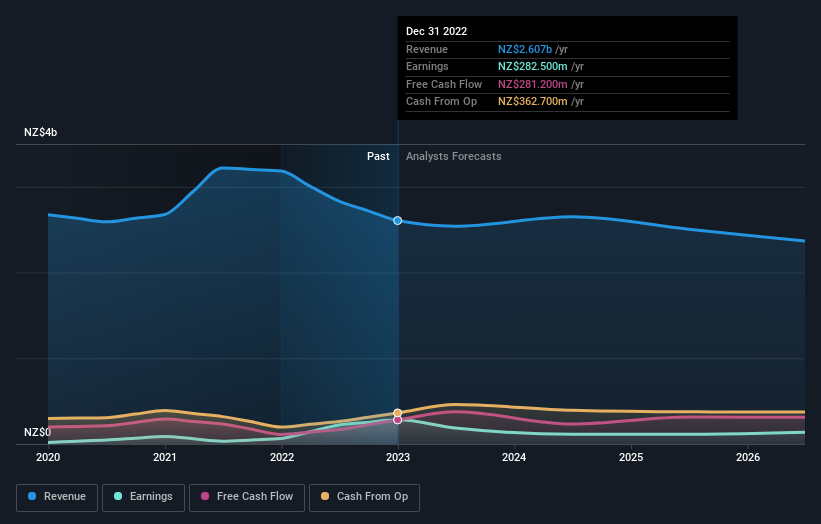Stock Analysis
- New Zealand
- /
- Electric Utilities
- /
- NZSE:GNE
Genesis Energy Limited's (NZSE:GNE) last week's 4.7% decline must have disappointed state or government who have a significant stake

Key Insights
- Significant control over Genesis Energy by state or government implies that the general public has more power to influence management and governance-related decisions
- New Zealand owns 51% of the company
- Using data from analyst forecasts alongside ownership research, one can better assess the future performance of a company
Every investor in Genesis Energy Limited (NZSE:GNE) should be aware of the most powerful shareholder groups. We can see that state or government own the lion's share in the company with 51% ownership. In other words, the group stands to gain the most (or lose the most) from their investment into the company.
As a result, state or government as a group endured the highest losses last week after market cap fell by NZ$133m.
Let's delve deeper into each type of owner of Genesis Energy, beginning with the chart below.
Check out our latest analysis for Genesis Energy

What Does The Institutional Ownership Tell Us About Genesis Energy?
Institutions typically measure themselves against a benchmark when reporting to their own investors, so they often become more enthusiastic about a stock once it's included in a major index. We would expect most companies to have some institutions on the register, especially if they are growing.
Genesis Energy already has institutions on the share registry. Indeed, they own a respectable stake in the company. This suggests some credibility amongst professional investors. But we can't rely on that fact alone since institutions make bad investments sometimes, just like everyone does. When multiple institutions own a stock, there's always a risk that they are in a 'crowded trade'. When such a trade goes wrong, multiple parties may compete to sell stock fast. This risk is higher in a company without a history of growth. You can see Genesis Energy's historic earnings and revenue below, but keep in mind there's always more to the story.

Genesis Energy is not owned by hedge funds. Looking at our data, we can see that the largest shareholder is New Zealand with 51% of shares outstanding. With such a huge stake in the ownership, we infer that they have significant control of the future of the company. Meanwhile, the second and third largest shareholders, hold 1.7% and 1.6%, of the shares outstanding, respectively.
While it makes sense to study institutional ownership data for a company, it also makes sense to study analyst sentiments to know which way the wind is blowing. Quite a few analysts cover the stock, so you could look into forecast growth quite easily.
Insider Ownership Of Genesis Energy
The definition of an insider can differ slightly between different countries, but members of the board of directors always count. Management ultimately answers to the board. However, it is not uncommon for managers to be executive board members, especially if they are a founder or the CEO.
Insider ownership is positive when it signals leadership are thinking like the true owners of the company. However, high insider ownership can also give immense power to a small group within the company. This can be negative in some circumstances.
Our data suggests that insiders own under 1% of Genesis Energy Limited in their own names. It is a pretty big company, so it would be possible for board members to own a meaningful interest in the company, without owning much of a proportional interest. In this case, they own around NZ$10m worth of shares (at current prices). Arguably, recent buying and selling is just as important to consider. You can click here to see if insiders have been buying or selling.
General Public Ownership
The general public-- including retail investors -- own 42% stake in the company, and hence can't easily be ignored. This size of ownership, while considerable, may not be enough to change company policy if the decision is not in sync with other large shareholders.
Next Steps:
It's always worth thinking about the different groups who own shares in a company. But to understand Genesis Energy better, we need to consider many other factors. For instance, we've identified 3 warning signs for Genesis Energy (1 is potentially serious) that you should be aware of.
Ultimately the future is most important. You can access this free report on analyst forecasts for the company.
NB: Figures in this article are calculated using data from the last twelve months, which refer to the 12-month period ending on the last date of the month the financial statement is dated. This may not be consistent with full year annual report figures.
Valuation is complex, but we're helping make it simple.
Find out whether Genesis Energy is potentially over or undervalued by checking out our comprehensive analysis, which includes fair value estimates, risks and warnings, dividends, insider transactions and financial health.
View the Free AnalysisHave feedback on this article? Concerned about the content? Get in touch with us directly. Alternatively, email editorial-team (at) simplywallst.com.
This article by Simply Wall St is general in nature. We provide commentary based on historical data and analyst forecasts only using an unbiased methodology and our articles are not intended to be financial advice. It does not constitute a recommendation to buy or sell any stock, and does not take account of your objectives, or your financial situation. We aim to bring you long-term focused analysis driven by fundamental data. Note that our analysis may not factor in the latest price-sensitive company announcements or qualitative material. Simply Wall St has no position in any stocks mentioned.
About NZSE:GNE
Genesis Energy
Generates, trades in, and sells electricity to residential and business customers in New Zealand.
Established dividend payer low.

